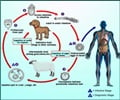There's good news for all (You and we). The efficacy of UV light in nullifying large cryptosporidiosis outbreaks have been proved by researchers.
There has been no efficient curative treatment for large cryptosporidiosis outbreaks so far.
French researchers have fond that extremely chlorine-resistant parasites called Cryptosporidium, which cause a diarrhoeal disease in humans and can lead to significant mortality in immunodeficient patients, become virtually inactive when exposed to industrial UV reactors.Human contamination of the waterborne disease called cryptosporidiosis occurs by ingestion of the resistant form of the parasite, either directly through person-to-person and animal-to-person routes or indirectly through environmental vehicles including water, food or soil.
However, collaborators from the University Denis Diderot in Paris and the VEOLIA Research Center in Maisons-Laffitte have now shown the efficacy of UV light in large-scale tests with pilot equipment.
The researchers spiked the water with large amounts of Cryptosporidium oocysts, and then passed it through the UV reactors.
Thereafter, they assessed the efficacy of medium-pressure and low-pressure UV reactors used in the water industry by using a sensitive cell culture method in the Denis Diderot’s University Laboratory of Parasitology.
The experiments successfully achieved inactivation rate of 99.998 per cent with both reactors.
Advertisement
“These tests, made in near real conditions, confirm that these industrial UV reactors could prevent waterborne outbreaks and secure water supply to customers,” said Dr. Cedric Feliers, who led the study conducted for the VEOLIA Research Center.
Advertisement
Source-Eurekalert
SPH/C











